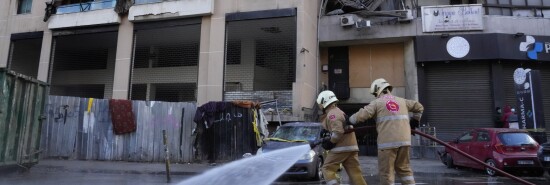
What Israel’s Beirut strike tells us
Sean Durns
Video Embed
American deterrence has been collapsing in the Middle East. But a recent Israeli strike in the heart of Lebanon could help restore it — if Washington gets out of its own way.
Israel has taken out a top Hamas leader in Beirut. The strike reveals much about the next phase of the war between Israel and Iranian proxies. But it also highlights systemic flaws in America’s Middle East policies.
TWELVE DAYS OF WEX-MAS: BIDEN SEEKS TO KEEP DEMOCRATS IN LINE AS PARTY EYES GAINS IN 2024
On Tuesday, an Israeli missile eliminated senior Hamas leaders in the southern suburbs of Beirut. Saleh al Arouri, the deputy chairman of the terrorist group’s “political bureau,” was among those killed, along with six other Hamas apparatchiks.
Arouri was a big fish. He helped mastermind the kidnapping and murder of Israeli teenagers, including dual U.S.-Israel citizen Naftali Fraenkel, that sparked the 2014 war between Hamas and Israel. And he reportedly played a key role in planning the Oct. 7 massacre that prompted the most recent war between the Jewish state and Iranian proxies.
In an Aug. 25, 2023, interview with Al Mayadeen TV, a Lebanese pro-Hezbollah media outlet, Arouri said that a “total war” with Israel was both “inevitable” and “necessary.”
Arouri was a founder of the Izz ad-Din al-Qassam Brigades and funded and directed the terrorist organization’s operations in the West Bank. On Sept. 10, 2015, the U.S. Department of Treasury sanctioned him as a specially designated terrorist and placed a $5 million bounty on his head. Arouri was widely viewed as an important conduit between the Gaza-based group and its chief patron, the Islamic Republic of Iran.
By taking out Arouri, Israel is sending a message. As its war in northern Gaza winds down, the Jewish state is signaling its resolve to eliminate those responsible for the massacre of Jewish civilians.
Israel has begun shifting to the “third phase” in its war, withdrawing some ground forces and transitioning to more localized operations in the Gaza Strip. The strike on Arouri, however, illustrates Israel’s steely determination. It also highlights Jerusalem’s reach, showing that the Israel Defense Forces can, and will, kill those responsible for Oct. 7 wherever they are — including in south Beirut, long a stronghold of Hezbollah, Iran’s foremost proxy.
In recent weeks, Israel has faced growing international pressure to wind down its military operation in the Gaza Strip. Yet, polls consistently show that an overwhelming majority of Israelis support the military deployment.
The Israeli strike is not only a message to Hamas and other Iranian proxies that seek Israel’s destruction. It is also a signal to Israel’s allies that there are limits to any pressure campaign. Israel will not be deterred. And Washington would be wise to listen.
Even before Oct. 7, American deterrence in the Middle East had collapsed. For years, Iranian proxies in Iraq and Syria have, with growing frequency, launched attacks on U.S. troops, injuring dozens, some severely. The Houthis, an Iranian-supported terrorist group based in Yemen, have attacked vessels in the Red Sea, effectively shutting down key shipping lanes. American credibility has been damaged.
CLICK HERE TO READ MORE FROM THE WASHINGTON EXAMINER
Nor has Washington been well served by its faux allies and a mirage of influence. The United States gives copious international aid to nations such as Qatar, Turkey, and Lebanon, even though all three have spent years harboring Hamas and other anti-American terrorist groups. Indeed, Arouri frequently shuttled between all three. That he and other Hamas leaders were in Lebanon, whose armed forces are dependent on U.S. financial assistance, is a searing indictment of American foreign policy in the region.
Arouri had the blood of innocents, including Americans, on his hands. Real allies don’t shelter such men; they eliminate them.
Sean Durns is a senior research analyst for CAMERA, the 65,000-member, Boston-based Committee for Accuracy in Middle East Reporting and Analysis.
